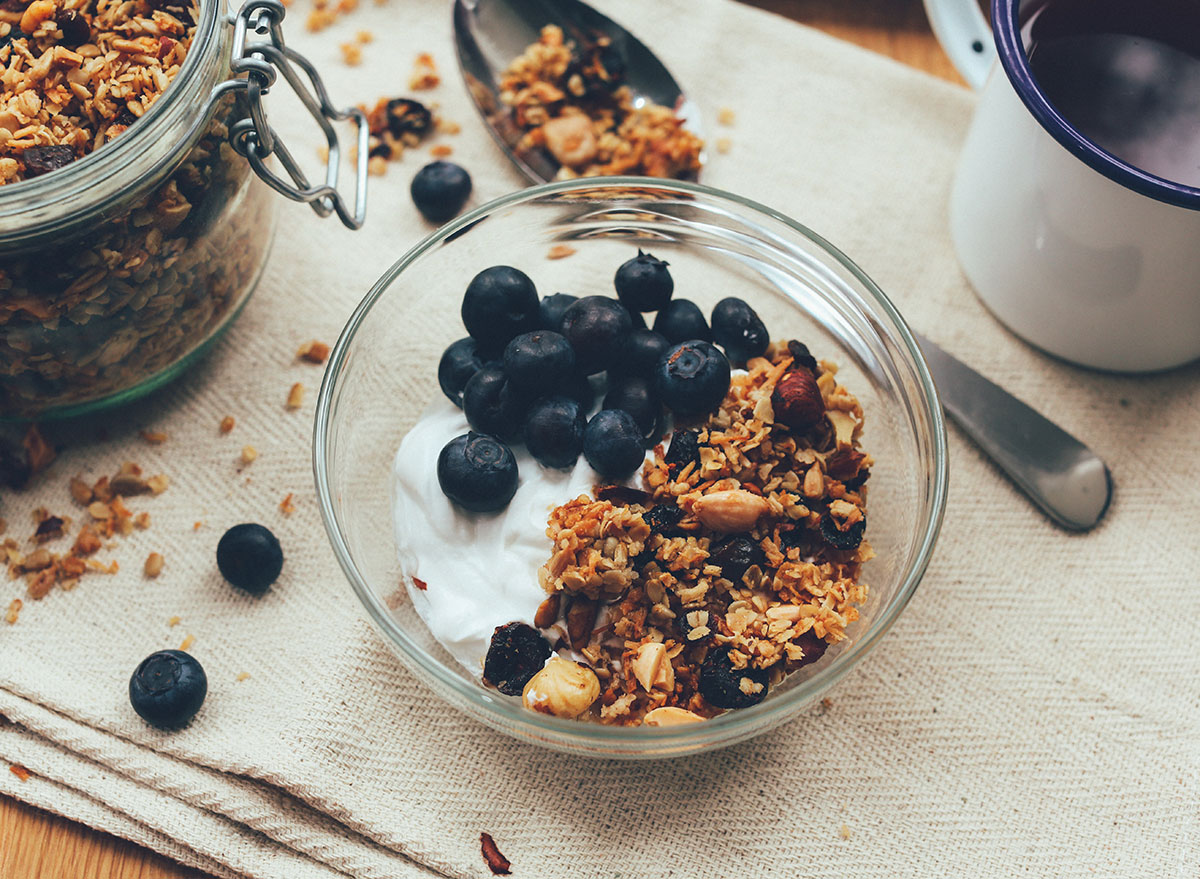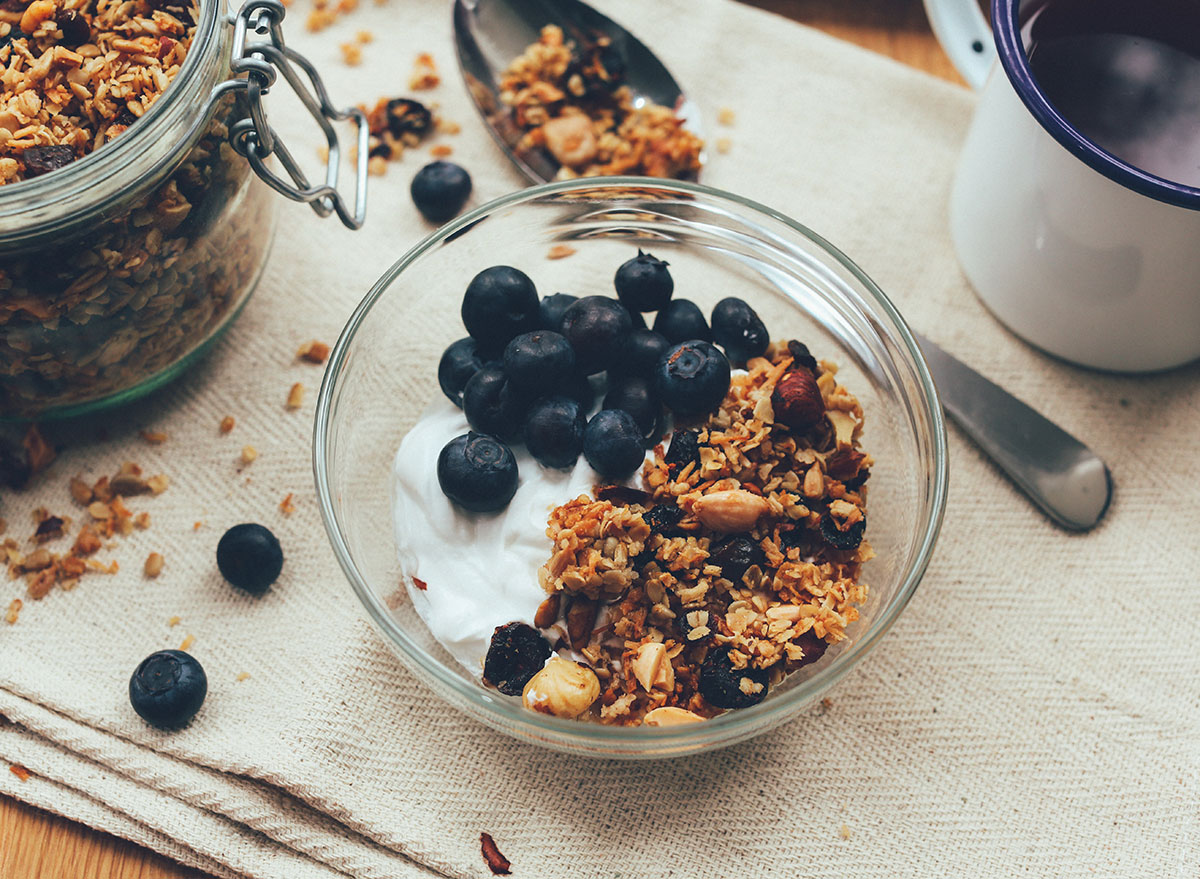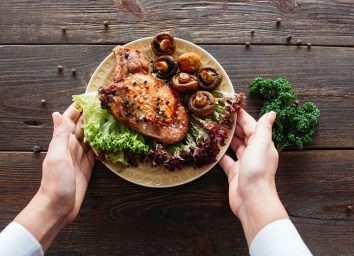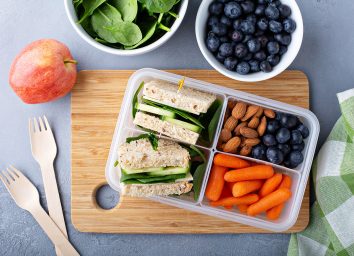Side Effects of Giving up Breakfast, According to Science
Eating a plate of eggs in the morning isn't all it's cracked up to be. In fact, there are numerous studies that show that breakfast isn't actually needed in order to help you lose weight. While many health experts say that eating breakfast is important for a healthy lifestyle, there isn't enough scientific evidence to back up this claim. In fact, there's more evidence that shows giving up breakfast can still result in healthy weight loss—if done correctly.
Are we saying you have to give up this meal for good? Absolutely not. In fact, many dietitians recommend that if you need sustenance in the morning to keep you satisfied and healthy, eating breakfast is likely something you should do. Especially if you work out in the morning because your muscles will need a boost of protein for recovery.
However, if you've never felt like you could stomach breakfast in the morning and have felt fine with a simple cup of coffee or tea, there's good news for you: giving up breakfast won't result in weight gain. You can still be perfectly healthy without breakfast in your daily diet.
Here are the specific side effects of giving up breakfast, straight from the research itself. And if you're looking for even more healthy eating tips, be sure to check out our list of The 7 Healthiest Foods to Eat Right Now.
You may lose weight.

According to studies, there is no significant link between eating breakfast and losing weight regularly. One study published by the British Medical Journal concluded in their analysis that there could be a "small difference in weight favoring participants who skipped breakfast." This, of course, was due to a decreased number of calories being consumed during the day.
Here are 21 Things That Happen to Your Body When You Skip Breakfast.
You'll consume fewer daily calories.

The reason people will likely lose weight if they're giving up breakfast? In general, you'll be consuming fewer calories. According to the Pew Research Center, Americans consume more than they used to 20 years ago. In 2010, the average American consumed 2,481 calories a day, which is 23% more than the numbers in 1970. The numbers could be even more now! Giving up breakfast can be a way to decrease that calorie intake—as well as these 40 Food Swaps That Cut Thousands of Calories.
You'll likely consume less sugar.

If your definition of breakfast includes a bowl of sugary breakfast cereal or a toaster pastry, then it's pretty obvious that giving up breakfast means consuming less sugar during the day. Some of these "breakfast staples" can be loaded with added sugars that won't make you feel full and instead, will leave you feeling sluggish and still hungry. Giving up breakfast can be an opportunity to cut these added sugars from your diet.
You'll miss an opportunity for nutrients.

Breakfast or not, eating a meal is important for giving our bodies the nutrients it needs. If you're focusing on healthy, good-for-you breakfast foods that aren't laden with added sugars, you're likely getting a variety of nutrients that are good for your overall health.
For example, if you enjoy avocado toast with a fried egg, you're getting all kinds of nutrients in that one small meal. If your bread is whole-grain you're getting good fiber. There's also fiber in the avocado as well as unsaturated fats, which help keep you full. The egg provides that extra boost of protein. Plus, along with having all of those health macronutrients (protein, fat, fiber-rich carbs), your breakfast is also full of micronutrients (vitamin C, vitamin B, vitamin D, magnesium, choline, potassium, iron, and more).
By giving up breakfast, you are losing an opportunity to get more of these nutrients into your diet. If this is something you decide to do, find ways to get more of those nutrients in your other meals during the day—like in an afternoon snack between lunch and dinner.
You may be overly hungry later.

Giving up breakfast is still skipping a meal, so if you're used to eating three square meals a day, you'll likely feel hungrier later. This could easily result in overeating during your other meals because your body is craving that extra fuel.
The best thing you can do for your body is finding ways to add in those calories at other points in your day and make sure you're eating the proper nutrients that keep you full. For example, when it's time for lunch, be sure to fill your plate with all of those proper elements—protein, fat, and fiber. An easy way to do this is following the USDA MyPlate Guidelines by filling half your plate with fruits and/or vegetables, a quarter with a healthy whole-grain, and the last quarter with a lean protein.
It's also wise to know how many calories you need to consume each day for optimal health, so you're still providing your body with those important nutrients. Here's how to make sure you're getting the right amount of calories every day.









